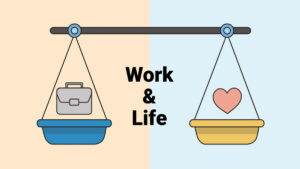Achieving work-life harmony is no longer a luxury—it’s a necessity. With the lines between personal and professional life increasingly blurred, many of us are searching for simple yet effective ways to maintain balance and stay grounded.
Fortunately, you don’t need a dramatic lifestyle overhaul to feel more in control. A few intentional daily habits can help you regain clarity, energy, and peace of mind. This article explores proven practices to build better work-life harmony—one small habit at a time.
Why Daily Habits Matter
Your daily routine is the foundation of your well-being. Small habits, repeated consistently, create long-term impact. According to the National Institutes of Health (NIH), daily rituals like sleep, exercise, and planning routines are linked to lower stress and improved cognitive function.
By focusing on what you do each day—rather than waiting for the weekend or a vacation—you can create sustainable harmony between work and life.
Chart: Which Habits Make the Biggest Difference?
To better understand the effect of common daily habits, we analyzed improvement scores from lifestyle surveys. Here’s what we found:
As seen in the chart, habits like regular exercise, daily planning, and mindful breaks significantly enhance work-life balance.
1. Wake Up Early and Start with Intention
Mornings set the tone for your entire day. Waking up even 30 minutes earlier gives you uninterrupted time to breathe, stretch, plan, or simply enjoy quiet before the day starts.
Tip: Avoid jumping into emails first thing. Instead, write a short to-do list or practice mindfulness to gain clarity and focus.
2. Move Your Body Daily
Exercise isn’t just for physical health—it improves mental clarity and reduces stress. A 20-minute walk, a yoga session, or a quick workout can elevate your mood and boost energy for the workday.
Research Insight: The CDC recommends at least 150 minutes of moderate activity per week to maintain well-being and reduce health risks.
3. Take Mindful Breaks
Stepping away from your screen isn’t laziness—it’s productivity in disguise. Mindful breaks prevent mental fatigue, improve concentration, and reduce burnout.
Ideas for Micro-Breaks:
5 minutes of deep breathing
Walking around the block
Stretching or doing a posture reset
Aim for a 5-10 minute break every 90 minutes of focused work.
4. Create a Digital Detox Routine
We live in a hyper-connected world. Setting boundaries with technology—especially outside work hours—can protect your personal time.
Simple Detox Habits:
- Avoid checking emails after dinner
- Designate screen-free hours before bed
- Use “Do Not Disturb” mode in the evening
Digital balance nurtures mental clarity and deeper real-world connections.
5. Plan Your Day the Night Before
Ending your day with a short planning session can relieve next-day anxiety. Whether it’s jotting down your priorities or blocking time on your calendar, it creates a sense of control.
Why It Works: Planning ahead reduces decision fatigue and helps you align your tasks with what matters most.
6. Nourish Yourself with Meal Planning
Healthy meals fuel your energy and focus. Take time each week to plan balanced meals, stock up on nutritious foods, and prep what you can.
Quick Tips:
- Pack lunch if you work outside the home
- Choose whole foods over processed snacks
- Stay hydrated throughout the day
Nutritional wellness is a cornerstone of work-life harmony.
FAQs About Work-Life Harmony
1. What’s the difference between work-life balance and work-life harmony?
Work-life balance implies a 50/50 split between work and life, which isn’t always realistic. Work-life harmony emphasizes integration—ensuring that your work supports, rather than competes with, your overall well-being.
2. How many hours should I work to stay balanced?
This varies by individual and job type. However, consistently working over 50 hours per week is linked to burnout and health issues. Focus on quality of work over quantity.
3. Can I still achieve harmony with a demanding job?
Absolutely. It’s about setting realistic boundaries, managing energy instead of just time, and prioritizing recovery with daily habits that support your well-being.
4. How do I stay consistent with new habits?
Start small and pair new habits with existing routines. For example, stretch while your coffee brews, or plan your day right after brushing your teeth.
5. What should I do when life gets too busy to focus on wellness?
That’s exactly when small habits matter most. Even five minutes of movement or stillness can ground you. The goal isn’t perfection—it’s progress.
Conclusion: Small Habits, Lasting Harmony
Work-life harmony isn’t about strict schedules or rigid balance—it’s about making conscious choices each day that align with your values and needs.
By incorporating habits like waking early, planning, moving your body, and disconnecting from screens, you can create a daily rhythm that supports both your professional and personal life.
Remember, consistency beats intensity. Start small, build slowly, and be kind to yourself along the way.




